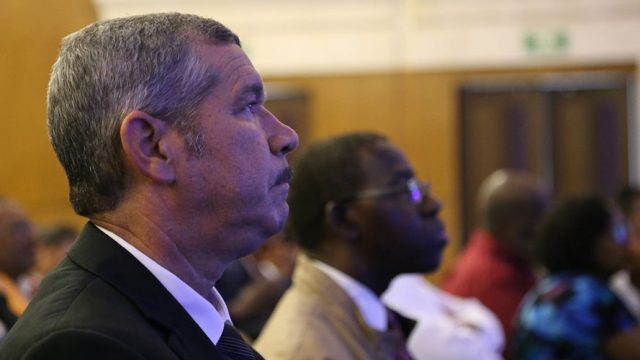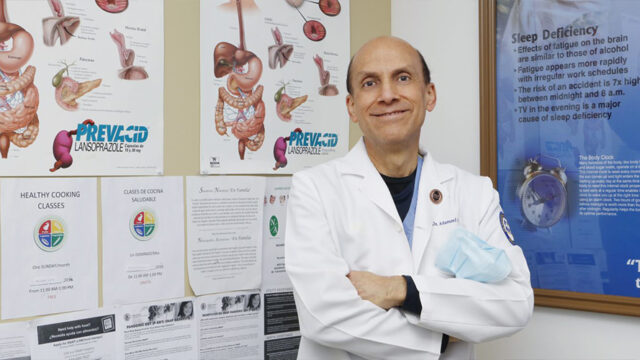Do Christians respond differently in times of crisis?

“Coronavirus,” “COVID-19,” “Pandemic,” “CDC” are now familiar terms to people all around the world.
Before this new wave of invisible enemies, we had others: “MRSA” and “Ebola.” None of these represents the first time that the world, including the world of Christian believers, was exposed to germs, even powerful, deadly germs. Pathogens have been here for millennia. It’s like King Solomon said when he asked the rhetorical question: “Is there any thing whereof it may be said, See, this is new?” (see Eccl 1:10, KJV).
Based on Solomon’s reliable wisdom, I submit that whereas Christians have had pandemics before, it behooves today’s Christians to see what they faced and how they responded.
Bringing Home the Spoils of War
The Roman soldiers marching home triumphantly after defeating the Parthians on their empire’s eastern edge, brought home spoils of war that constituted much more than they knew. Marching west toward home
“they carried with them more than the spoils of plundered Parthian temples; they also carried an epidemic that would ravage the Roman Empire over the course of the next two decades, an event that would inexorably alter the landscape of the Roman world. The Antonine Plague, as it came to be known, would reach every corner of the empire and is what most likely claimed the life of Lucius Verrus himself in 169—and possibly that of his co-emperor Marcus Aurelius in 180.”1
Today, America and the rest of the world confront the same menace that hostile germs presented to the ancient Roman Empire: the failing health of its citizens, and the dramatic halt to their economy. Egyptian documents, papyri from Oxyrhynchus and Fayum, record the damage “that mortality and the subsequent flight of fearful survivors” caused to city administrators’ tax revenues.2 Similarly today, survivors of large urban centers affected by COVID-19 are seeking some “safer” location, to the displeasure of those living already in smaller towns or rural areas.
Decline of tax bases for the Roman Empire’s local administrative units was further aggravated by the loss of income through the cessation of building projects that had so well supported second-century Rome’s robust economy.3 That situation of economic chaos that could not have been any more dramatic than the havoc wrought on economic growth in the United States where three weeks of virus-inspired pandemonium were enough to erase three years of sensational growth, as indicated by the Dow Jones averages.
Note, too, that that second-century pandemic did not halt the Roman economy evenly. Building projects did not stop in Spain and North African provinces outside of Egypt. The case is similar today, with some sectors of population and economy being disproportionately devastated by our own modern pestilence.
Christian Response
Americans have always been resilient as they faced past calamities. Today is no different. But this does not mean that COVID-19 has not affected our American psyche. Frightened people around us rush to stores to purchase large amounts of groceries, toilet paper, hand sanitizers, etc. Its expressions may be different, but panic is not new.
In a recent CNN Special, New Testament professor Candida Moss cited one bishop’s detailed description of a plague that caused havoc between a.d. 250 and 270:
“The intestines are shaken with a continual vomiting; the eyes are on fire with the infected blood; that in some cases the feet or some parts of the limbs are taken off by the contagion of diseased putrefaction.”4
The disease sometimes even caused blindness and deafness, and at its height was killing 5,000 people every day in Rome alone. But perhaps the most astonishing result of the disease was what it did for Christians and Christianity. Emperor Decius blamed the Christians for it, but his scandalous claim had to confront two incontrovertible facts: for one thing, Christians died just like anyone else did; for another, unlike everybody else, Christians cared for the plague’s victims, including their pagan neighbors. Nothing new either, if we wanted to echo Solomon. For they had done the same during the Antonine Plague a century before. Christians stayed and served in the middle of suffering even as society’s pagan leaders, physicians included, took their flight.5 Christ’s followers remembered the words of their Master, “I was sick and you looked after me” (Matt. 25:36).
Years ago, when MRSA was the new virus, I read about the pagans’ response during these ancient times of horror. Pagans fled in terror rather than treat their own infected relatives, while fourth-century emperor Julian the Apostate was obliged to acknowledge how “the impious Galileans support not only their own poor but ours as well.”6
Were Christian believers concerned about catching a deadly disease? They must have been. What then? Could it be that what kept them serving in spite of their fears was their principled anchorage in three principles: “power, love and self-discipline” (2 Tim. 1:7)?
We can accept our fears, but they do not have to become our masters. Those Christian believers living and serving during those pandemics were not natural heroes. They simply chose not to flee for fear. The power of God provided the strength of conviction that prompted their actions. His motivating love went far beyond philanthropy. It was the sacrificial love of Calvary. Their decision to stay and serve did not ignore the facts and potential risks. But they had learned self-discipline. Discipline instilled in them calm and self-control, the will to fight instead of flee. Alexandrian bishop Dionysius wrote that for Christians “it was a period of unimaginable joy.”7 Serving when they and everyone else knew that they could die showed that Christianity was worth living by and dying for.
I am convinced that in the early centuries of Christianity belief in the resurrection of the righteous meant something deeper, more transcendent than for today’s twenty-first century Christians. Those early Christians faced death everywhere they looked, it seems. There was death by execution, being devoured by wild beasts, becoming flaming lanterns to illuminate Nero’s nights; and beyond pagan hostility there were pandemics killing all and sundry, and in greater numbers among those who chose to serve their fellow sick, whether Christian or pagan.
Plagues and Christians
During a recent Ebola crisis, Stephen Rowden volunteered for Doctors Without Borders in Monrovia, Liberia, managing teams that collected the bodies of Ebola victims—10 to 25 per day. Contact with victims is the main means by which the virus spreads. National Public Radio host interviewer Robert Seigel wanted to know if Rowden was a religious person. Rowden replied, “I am. Yes, I’m a practicing Christian.” Siegel asked if the disease tested his faith. Rowden replied: “No, I got great strength from my faith and the support of my family.” Nearly 18 centuries after the Cyprian Plague, Eric Metaxas writes, “Christianity still prompts people to run towards the plague when virtually everyone else is running away.”8
Pestilence and plague are not new for Christians, nor are they merely stories from long ago and far away. I remember when HIV and AIDS began in the 1980s, continuing in the 1990s. Those were days of fear, discrimination, and outright panic—even about sitting on a commode where an AIDS victim may have sat before. My wife and I were invited to visit and stay a weekend with a sister of our church who had been diagnosed as HIV positive. She had children of the same age as ours. We knew that the main source of transmission was through the exchange of body fluids, or blood transfusion. Yet, there were still suspicions about other forms of transmission. We thought and prayed about what we should do. In the end we accepted her invitation. We love her family now just as prior to her diagnosis. Our fears were set aside as we trusted to follow our Master’s commands: “love your neighbor as yourself”; visit the sick; and “do to others as you would have them do to you” (Mark 12:31; Luke 6:31). None in our family became ill as a result.
Richard Land is right to wonder,
“How different the last four decades of our nation’s cultural and spiritual history would have been if Christians had done ‘what Jesus would do’ and we had volunteered in overwhelming numbers at AIDS hospices to aid and comfort the tragic victims of that epidemic, modeling the transforming love of Jesus before a watching world.”9
Today’s great threat isn’t MRSA, Ebola, or AIDS. Our challenge is COVID-19. And the world will indeed note how followers of Jesus Christ react and respond to this latest pandemic. For one thing, we need to avoid presumption, to avoid unnecessary exposure to danger. We should follow sound scientific and administrative counsel against large social gatherings; we should promote social distancing. The publicity that results from violating the directives of health authorities is not favorable to promotion of the three angels’ messages of Revelation 14. “The sin of presumption lies close beside the virtue of perfect faith and confidence in God. . . . Upon this point many souls are wrecked.”10 Satan failed when he tried to coax Jesus into presumption by citing Scripture to prove that God would protect Him anytime, anyhow (Matt. 4:6, 7). He shouldn’t succeed with us either.
But are there “thou shalts” to balance our “thou shalt nots”? There surely are. We need to stay connected in prayer and encouragement with family, friends, neighbors, and church members through the wonderful range of twenty-first century communication tools available to us. We must participate in providing emotional, material, spiritual, and financial support where we can, whether in our neighborhood, the scope of our church, our local conference, or beyond our borders in foreign missions. The COVID-19 pandemic has now compounded need, making many situations more vulnerable than ever before.
Just think of it, fellow Christian: what Solomon said is still true. There’s nothing new. The choice to sacrifice for someone else’s sake didn’t just arise in your heart: it has always been, and still is, on Jesus’ heart. And though we may not now physically assemble for worship or knock on doors for witness, we know at least one place where there’s need for ministry. If there is no other place we must consider in our prayers and ask for divine ingenuity to serve and support, it’s a hospital near or far from you where lives are on the line, where women and men of courage are fighting to save one more life. For Jesus’ sake (see Mat. 25:31-40), we must lend support, whether there or wherever else we can, as much as we can, for all whom we can, for as long as we can. It’s what Jesus would always have us do.
1 Sarah K. Yeomans, “Classical Corner: The Antonine Plague and the Spread of Christianity,” https://www.baslibrary.org/biblical-archaeology-review/43/2/18; accessed 3/20/2020.
2 Yeomans, ibid., quoting R. S. Bagnall, “Oxy. 4527 and the Antonine Plague in Egypt: Death or Flight?” Journal of Roman Archaeology 13 (2000), pp. 288–292.
3 Ibid.
4 Candida Moss, “How an apocalyptic plague helped spread Christianity,” CNN Special, June 23, 2014: https://religion.blogs.cnn.com/2014/06/23/how-an-apocalyptic-plague-helped-christianity/; accessed 3/20/2020.
5 Eric Metaxas, “Running Toward the Plague: Christians and Ebola”: https://www.christianpost.com/news/running-toward-the-plague-christians-and-ebola.html; accessed 3/20/2020.
6 Ibid.
7 Moss, ibid.
8 Metaxas, ibid.
9 Richard Land, “Ask Dr. Land: How should Christian respond to the Coronavirus Pandemic?”: https://www.christianpost.com/news/ask-dr-land-how-should-christians-respond-to-the-coronavirus-pandemic.html; accessed 3/20/2020.
10 Ellen G. White, Confrontation (Washington, D. C.: Review & Herald Pub. Assn., 1971), p. 48.








